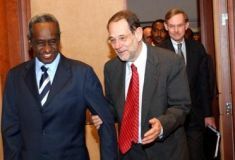EU, US urge Sudan to allow UN peacekeepers into Darfur
Mar 8, 2006 (BRUSSELS) — European Union, U.S. and African officials urged Sudan on Wednesday to allow a large U.N. peacekeeping force to replace the current African Union mission in the troubled Darfur region.
 Darfur’s conflict, described by the U.N. as the world’s gravest humanitarian crisis, has left more than 180,000 people dead and 2 million displaced.
Darfur’s conflict, described by the U.N. as the world’s gravest humanitarian crisis, has left more than 180,000 people dead and 2 million displaced.
“We cannot continue the situation in Darfur as it is now,” E.U. foreign policy chief Javier Solana said after chairing international talks to help spur peace talks to bring the three-year conflict to an end.
U.S. Deputy Secretary of State Robert Zoellick said that both the E.U. and Washington wanted to have a bigger peacekeeping force in place in Darfur, but it had to coincide with achieving a lasting peace deal between Darfur rebels and the Sudanese government.
“We hope that the Sudanese government will not resist,” Zoellick said after the talks. “We hope that the Sudanese government will recognize how this is in its interest to end the violence.”
Sudan’s Vice President Ali Osman Mohamed Taha, who attended the talks was expected to return to meet Solana again early Thursday, officials said.
Also attending Wednesday’s talks was AU Commission chairman Alpha Oumar Konare and U.N. Assistant Secretary-General for Peacekeeping Hedi Annabi.
Numerous rounds of peace talks in Abuja, Nigeria, have been stalled by internal divisions in the rebel movements.
“We have to provide a roadmap for the Abuja peace process,” Solana told reporters.
Konare said that a new plan would help speed up peace talks so a settlement could be reached as quickly as possible to allow for a reinforced peacekeeping mission under a U.N. flag. “We need to move fast,” he said.
E.U. officials said a new roadmap would include benchmarks to ensure that a new cease-fire between the warring sides could last and lead to a permanent end to the fighting.
Sudanese officials, however, are opposed to having a U.N. force or non-African troops in Darfur. The African Union has a 7,000-strong mission in the region, but the peacekeeping mandate ends at the end of March and funds are dwindling.
Zoellick said during his four visits to Darfur he heard widespread appeals from people there that they wanted peacekeepers there.
“If we push for a peace agreement we then will ultimately have to create the conditions for people to return home and that what this (U.N.) force could do,” said Zoellick, adding that the current force was unable to provide adequate protection for people caught in the conflict.
“This area is the size of France. Imagine having 7,000 people trying to ensure security in a situation where the cease-fire has broken down,” Zoellick said. “We believe the African Union has played a role, will continue to play a key role … but also needs our help.”
E.U. Development Commissioner Louis Michel said the E.U. – which has sent millions of euros in humanitarian aid to Darfur – was ready to give more, adding that a U.N. force could help in securing the safety of international aid workers in Darfur.
The U.S. and E.U. have said they could provide airlift and logistical support to an expanded U.N. mission in Darfur, but have not said they would contribute troops. Zoellick said he would ask the North Atlantic Treaty Organization what military role it could play to help.
African nations plan Friday to discuss whether the AU should hand the mission over to the U.N. when the peacekeeping mission expires this month.
The AU mission has been hampered by a shortage of funds, troops and equipment, and its mandate has been limited to monitoring an April 2004 cease-fire that is regularly broken by all parties and offers limited protection to civilians.
The conflict erupted in February 2003, when ethnic African tribes took up arms, accusing the Arab-dominated central government of neglect. For decades, tribes had been engaging in low-level clashes over land and water in the vast western region.
The Sudanese government is widely alleged to have unleashed Arab militias who carried out sweeping atrocities against ethnic African villagers. Sudan’s government has denied supports the militia, known as Janjaweed.
(ST/AP)
